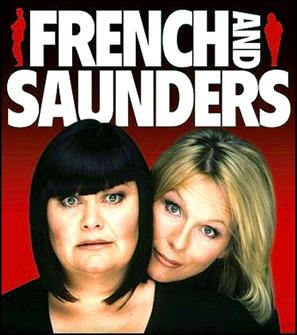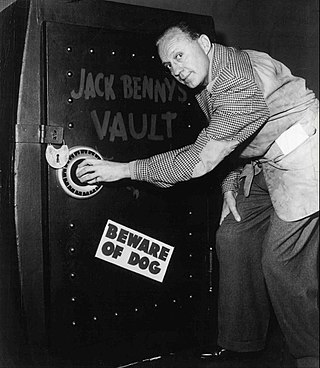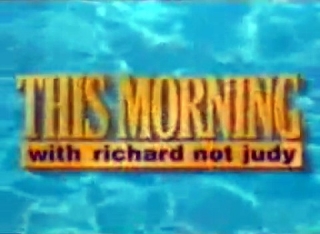A rerun or repeat is a rebroadcast of an episode of a radio or television program. The two types of reruns are those that occur during a hiatus and those that occur when a program is syndicated.

You Can't Do That on Television is a Canadian sketch comedy television series that first aired locally in 1979 before airing in the United States in 1981. It featured pre-teen and teenage actors in a sketch comedy format similar to that of American sketch comedy Rowan & Martin's Laugh-In and Canadian sketch comedy Second City Television. Each episode had a specific theme normally relating to the popular culture of the time.

French and Saunders is a British sketch comedy television series written by and starring comedy duo and namesake Dawn French and Jennifer Saunders that originally broadcast on BBC2 from 1987 to 1993, and later on BBC One until 2017. It is also the name by which the performers are known on the occasions when they appear elsewhere as a double act. The show was given one of the highest budgets in BBC history to create detailed spoofs and satires of popular culture, movies, celebrities, and art. French and Saunders continued to film holiday specials for the BBC, and both have been individually successful starring in other shows.

A running gag, or running joke, is a literary device that takes the form of an amusing joke or a comical reference and appears repeatedly throughout a work of literature or other form of storytelling. Though they are similar, catchphrases are not considered to be running gags.
A blooper is a short clip from a film or video production, usually a deleted scene, containing a mistake made by a member of the cast or crew. It also refers to an error made during a live radio or TV broadcast or news report, usually in terms of misspoken words or technical errors. The term blooper was popularized in the 1950s and 1960s in a series of record albums produced by Kermit Schafer entitled Pardon My Blooper, in which the definition of a blooper is thus given by the record series' narrator: "Unintended indiscretions before microphone and camera."

Crow T. Robot is a fictional character from the American science fiction comedy television series Mystery Science Theater 3000 (MST3K). Crow is a robot, who, along with others, ridicules poor-quality B to Z movies.

Home Movies is an American animated sitcom created by Brendon Small and Loren Bouchard. The show centers on an eight-year-old aspiring filmmaker, also named Brendon Small, who makes homemade film productions in his spare time with his friends Melissa Robbins and Jason Penopolis. He lives with his divorced mother Paula and his adopted baby sister Josie. He develops a skewed father-son-like relationship with his alcoholic, short-tempered soccer coach, John McGuirk.
Just for Laughs Gags is a Canadian live-action silent comedy/hidden camera reality television show that is under the Just for Laughs brand created by Pierre Girard and Jacques Chevalier.

Arrested Development is an American television sitcom created by Mitchell Hurwitz. It aired on Fox for three seasons from November 2, 2003, to February 10, 2006, followed by two seasons on Netflix, season four being released in 2013 and season five being released in 2018 and 2019.

A crossover is the placement of two or more otherwise discrete fictional characters, settings, or universes into the context of a single story. They can arise from legal agreements between the relevant copyright holders, unofficial efforts by fans, or common corporate ownership.

Police Squad! is an American television crime comedy series that was broadcast on the ABC network in 1982. It was created by David Zucker, Jim Abrahams, and Jerry Zucker, starring Leslie Nielsen as Frank Drebin. A spoof of police procedurals and many other television shows and movies, the series features Zucker, Abrahams, and Zucker's usual sight gags, wordplay, and non sequiturs. It resembles the Lee Marvin police show M Squad and the late 1960s series Felony Squad. It was canceled after six episodes, and yielded The Naked Gun film series from 1988 to 1994.

The Jack Benny Program, starring Jack Benny, is a radio and television comedy series, which ran for more than three decades and is generally regarded as a high-water mark in 20th-century American comedy. He played one role throughout his radio and television career, a caricature of himself as a minimally talented musician and penny-pincher who was the butt of all the jokes. The show's producer, Hilliard Marks, was the brother of Benny's wife, Mary Livingstone.

This Morning With Richard Not Judy or TMWRNJ is a BBC comedy television programme, written by and starring Lee and Herring. Two series were broadcast in 1998 and 1999 on BBC Two. The name was a satirical reference to ITV's This Morning which was at the time popularly referred to as This Morning with Richard and Judy.

Drawn Together is an American adult animated sitcom created by Dave Jeser and Matt Silverstein for Comedy Central. It premiered on October 27, 2004. The series is a parody of house-based reality shows such as The Real World, The Surreal Life, and Big Brother, and follows the misadventures of the housemates in the fictional show of the same name and uses a sitcom format with a reality TV show setting.
A flashback is an interjected scene that takes the narrative back in time from the current point in the story. Flashbacks are often used to recount events that happened before the story's primary sequence of events to fill in crucial backstory. In the opposite direction, a flashforward reveals events that will occur in the future. Both flashback and flashforward are used to cohere a story, develop a character, or add structure to the narrative. In literature, internal analepsis is a flashback to an earlier point in the narrative; external analepsis is a flashback to a time before the narrative started.

"Pilot" is the first episode of the American television sitcom Arrested Development. It originally aired on the Fox network in the United States on November 2, 2003. In the episode, George Sr. is about to announce his retirement when he is arrested for using his company's funds for personal expenses. It was written by series creator and executive producer Mitchell Hurwitz and was directed by Anthony and Joe Russo. An uncensored, extended version of the episode was released as a special feature on the DVD home release.
The following glossary of words and terms are related to owarai. Many of these terms may be used in areas of Japanese culture beyond comedy, including television and radio, music. Some have been incorporated into normal Japanese speech.
A post-credits scene is a short teaser clip that appears after the closing credits have rolled and sometimes after a production logo of a film, TV series, or video game has run. It is usually included to reward the audience for having the patience to watch through the credits sequence; it may be a scene written for humour or to set up a sequel.
In broadcasting, cancellation refers to when a radio or television program is abruptly ended by orders of the network or syndicator that distributes the show.

A television show – or simply TV show – is the general reference to any content produced for viewing on a television set which is broadcast via over-the-air, satellite, or cable. This includes content made by television broadcasters and content made for broadcasting by film production companies. It excludes breaking news, advertisements, or trailers that are typically placed between shows. Television shows are most often scheduled for broadcast well ahead of time and appear on electronic guides or other TV listings, but streaming services often make them available for viewing anytime. The content in a television show is produced by one of two production methodologies, live taped shows such as variety and news magazine shows shot on a television studio stage or sporting events The other production model includes animation and the variety of film productions ranging from movies to series. Shows not produced on a television studio stage are usually contracted or licensed to be made by appropriate production companies.











